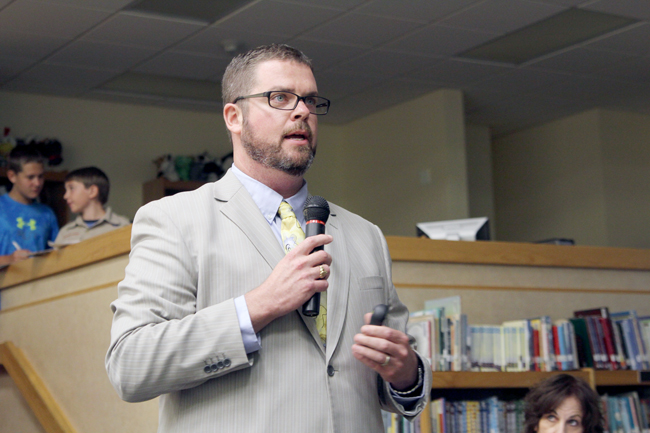Riverhead unveils new program to increase graduation rates


Riverhead School District officials say they’re focused on improving graduation rates and will implement a new program to help students from falling behind on their studies.
David Wicks, assistant superintendent for curriculum and instruction gave a presentation along with high school principal Charles Regan at Tuesday’s school board meeting to discuss a new plan to help students complete school.
Mr. Wicks said the district’s most recent data listed on the state’s annual report card is for the 2011-12 school year and shows 74 percent of high school students graduated.
The district has been cited for failing to meet graduation rates the state has set, he said, specifically because only 51 percent of Latino students and 66 percent of economically disadvantage students graduated in 2012.
According to enrollment statistics provided by the district, there were 1,525 students enrolled at Riverhead High School during the 2011-12 school year, with 333 Latino students. Enrollment statistics for economically disadvantaged students wasn’t provided.
The district is projecting a “significant improvement” in those areas for the 2012-13 school year, Mr. Wicks said.
He’s predicting graduation rates will reflect an increase to 78 percent for the Class of 2013, with 63 percent of Latino students and 70 percent of economically disadvantaged students graduating.
However, the district is also projecting a decrease in graduation rates for black students (65 percent, down from 69 percent), and students with disabilities (48 percent, down from 53 percent) over the same time frame.
Mr. Wicks said the 2011-12 graduation rates were calculated with a cohort student body, meaning the group of students that entered into ninth grade in 2008 were expected to graduate in four years.
He said there are three situations that affect a district’s graduation rate: Dropping out by officially withdrawing from school, no longer attending school, or failing academically. As a group, these students are considered “non-completers,” Mr. Wicks said.
Students that transfer out of Riverhead and into another school aren’t calculated into the graduation rate, he added.
Mr. Regan said the school will identity at-risk seniors and put together a plan that “incorporates the guidance counselors, teachers, parents and other support personnel and see what that student needs to graduate.”
“I’m very hopeful that will bring forward a lot of seniors we may lose and help them see the light at the end of the tunnel,” he said.
Also starting this school year is a “credit recovery” program to help students that cannot attend summer school catch up.
Students that fail English 9, English 10, or Global 9 will still be able to take the next level, as long as they also take a skills version of the class they need to retake.
For example, if a ninth-grade student fails English 9, then the following year he or she will still be able to enroll in English 10, but will also be required to take English 9 every other day.
The skills class version will “dovetail into what’s going on in the 10th-grade class” and will help keep students “on pace to graduate,” Mr. Regan said.
He also said the district is hiring two additional ESL teachers and parents will now be able to view their children’s grades on the parent portal.
Students received their own portal last year and both systems will have the same info, Mr. Regan said.
School board member Amelia Lantz said she believes a method to help improve graduation rates is to require all teachers to use a program called “E-Boards” that shows parents their children’s assignments.
“That could be the missing link,” she said.
School board member Lori Hulse agreed and questioned if teachers could be mandated to use E-Boards.
Riverhead Central Faculty Association second vice president Gary Karlson said he disagrees with requiring all teachers to use one form of technology because some teachers prefer other methods.
“I just hope you and people in the community don’t judge teachers by if they’re an E-Board user or E-Boardless educator,” he said.
Mr. Wicks said he will find out how many teachers are using E-Boards and if the district could require all teachers to use them.







